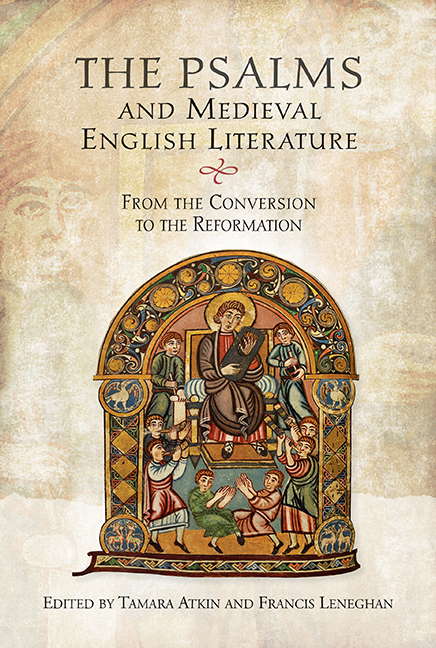Book contents
- Frontmatter
- Contents
- Figures
- Contributors
- Preface
- Acknowledgements
- Abbreviations
- Miscellaneous Frontmatter
- Introduction A Case Study of Psalm 50.13 in Old and Middle English
- I Translation
- II Adaptation
- 6 Making the Psalter Sing: the Old English Metrical Psalms, Rhythm and Ruminatio
- 7 The Psalms in the Old English Office of Prime
- 8 Psalm Genres in Old English Poetry
- 9 Articulating the Psalms in Middle English Alliterative Poetry: Some Passages of Piers Plowman, St Erkenwald and Pearl
- III Voice
- Index
7 - The Psalms in the Old English Office of Prime
from II - Adaptation
Published online by Cambridge University Press: 09 May 2017
- Frontmatter
- Contents
- Figures
- Contributors
- Preface
- Acknowledgements
- Abbreviations
- Miscellaneous Frontmatter
- Introduction A Case Study of Psalm 50.13 in Old and Middle English
- I Translation
- II Adaptation
- 6 Making the Psalter Sing: the Old English Metrical Psalms, Rhythm and Ruminatio
- 7 The Psalms in the Old English Office of Prime
- 8 Psalm Genres in Old English Poetry
- 9 Articulating the Psalms in Middle English Alliterative Poetry: Some Passages of Piers Plowman, St Erkenwald and Pearl
- III Voice
- Index
Summary
The psalter used in Jewish worship passed seamlessly into the life of the early Christian Church. Over the next millennium the pattern of the Church's daily cycle of prayer developed around the use of the Psalter, with a rich variety of offices East and West, monastic and clerical. The extensive use of the Psalter as a specialized and regular devotion among professional ascetics has its origins in the monastic movement of the Egyptian desert, where monks would recite the entire Psalter daily. The picture of how the Psalter was used in the official daily prayer of the Anglo-Saxon church has recently been described by Jesse Billett in a wide-ranging study of the few books and texts of the office that survive from Anglo-Saxon England. Billett outlines the history of the Divine Office in Anglo-Saxon England from its introduction by Augustine of Canterbury and his fellow missionaries at the end of the sixth century to the Benedictine reforms of the late tenth century. For the period from the sixth to the ninth centuries we know very little from liturgical manuscripts, although we have some anecdotal evidence from literary sources. For the later period we know that the influence of the Rule of St Benedict was consolidated by the Benedictine Reform of the tenth century and that the reform of secular clerical life also saw the impact of rules for canons. The earliest office used in England almost certainly would have been based on that sung in St Peter's Basilica in Rome, an ancient usage that influenced the weekly cycle of the Psalter recommended in Chapter 18 of the Rule of St Benedict. The psalter text used in the office in Rome was the so-called Romanum Psalter, then believed to be the first of St Jerome's translations of the Hebrew text, although it is probably more ancient and not by Jerome. While broadly similar in outline, the texts sung in churches and monasteries could vary greatly in their psalm selection for certain hours, as could the antiphons and responsories associated with the psalms and lessons. In all cases the psalms, lessons, antiphons and responsories used in ordinary (or ferial) time gave way to others used on feast days and in seasons such as Advent and Lent, and it was always the objective to recite the full Psalter across the course of a week.
- Type
- Chapter
- Information
- The Psalms and Medieval English LiteratureFrom the Conversion to the Reformation, pp. 198 - 217Publisher: Boydell & BrewerPrint publication year: 2017

